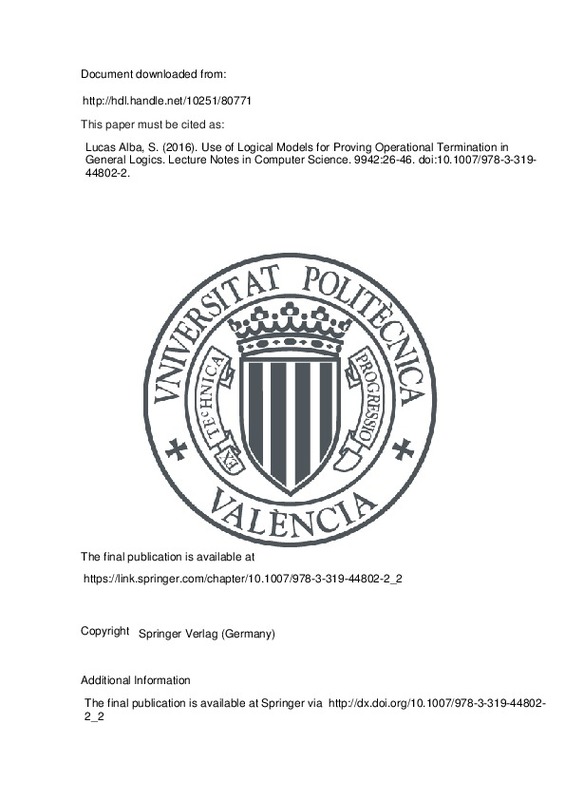JavaScript is disabled for your browser. Some features of this site may not work without it.
Buscar en RiuNet
Listar
Mi cuenta
Estadísticas
Ayuda RiuNet
Admin. UPV
Use of Logical Models for Proving Operational Termination in General Logics
Mostrar el registro sencillo del ítem
Ficheros en el ítem
| dc.contributor.author | Lucas Alba, Salvador
|
es_ES |
| dc.date.accessioned | 2017-05-09T12:20:29Z | |
| dc.date.available | 2017-05-09T12:20:29Z | |
| dc.date.issued | 2016-08 | |
| dc.identifier.issn | 0302-9743 | |
| dc.identifier.uri | http://hdl.handle.net/10251/80771 | |
| dc.description | The final publication is available at Springer via http://dx.doi.org/10.1007/978-3-319-44802-2_2 | es_ES |
| dc.description.abstract | [EN] A declarative programming language is based on some logic L and its operational semantics is given by a proof calculus which is often presented in a natural deduction style by means of inference rules. Declarative programs are theories S of L and executing a program is proving goals ϕ in the inference system I(S) associated to S as a particulariza-tion of the inference system of the logic. The usual soundness assumption for L implies that every model A of S also satisfies ϕ. In this setting, the operational termination of a declarative program is quite naturally defined as the absence of infinite proof trees in the inference system I(S). Proving operational termination of declarative programs often involves two main ingredients: (i) the generation of logical models A to abstract the program execution (i.e., the provability of specific goals in I(S)), and (ii) the use of well-founded relations to guarantee the absence of infinite branches in proof trees and hence of infinite proof trees, possibly taking into account the information about provability encoded by A. In this paper we show how to deal with (i) and (ii) in a uniform way. The main point is the synthesis of logical models where well-foundedness is a side requirement for some specific predicate symbols. | es_ES |
| dc.description.sponsorship | Partially supported by the EU (FEDER), Spanish MINECO TIN 2013-45732-C4-1-P and TIN2015-69175-C4-1-R, and GV PROMETEOII/2015/013. | |
| dc.format.extent | 21 | es_ES |
| dc.language | Inglés | es_ES |
| dc.publisher | Springer Verlag (Germany) | es_ES |
| dc.relation.ispartof | Lecture Notes in Computer Science | es_ES |
| dc.rights | Reserva de todos los derechos | es_ES |
| dc.subject | Abstraction | es_ES |
| dc.subject | Logical models | es_ES |
| dc.subject | Operational termination | es_ES |
| dc.subject.classification | LENGUAJES Y SISTEMAS INFORMATICOS | es_ES |
| dc.title | Use of Logical Models for Proving Operational Termination in General Logics | es_ES |
| dc.type | Artículo | es_ES |
| dc.type | Comunicación en congreso | |
| dc.identifier.doi | 10.1007/978-3-319-44802-2 | |
| dc.relation.projectID | info:eu-repo/grantAgreement/MINECO//TIN2013-45732-C4-1-P/ES/UNA APROXIMACION DECLARATIVA AL MODELADO, ANALISIS Y RESOLUCION DE PROBLEMAS/ | es_ES |
| dc.relation.projectID | info:eu-repo/grantAgreement/GVA//PROMETEOII%2F2015%2F013/ES/SmartLogic: Logic Technologies for Software Security and Performance/ | es_ES |
| dc.relation.projectID | info:eu-repo/grantAgreement/MINECO//TIN2015-69175-C4-1-R/ES/SOLUCIONES EFECTIVAS BASADAS EN LA LOGICA/ | |
| dc.rights.accessRights | Abierto | es_ES |
| dc.contributor.affiliation | Universitat Politècnica de València. Escola Tècnica Superior d'Enginyeria Informàtica | es_ES |
| dc.description.bibliographicCitation | Lucas Alba, S. (2016). Use of Logical Models for Proving Operational Termination in General Logics. Lecture Notes in Computer Science. 9942:26-46. https://doi.org/10.1007/978-3-319-44802-2 | es_ES |
| dc.description.accrualMethod | S | es_ES |
| dc.relation.conferencename | Rewriting Logic and Its Applications, WRLA 2016 | es_ES |
| dc.relation.conferencedate | April 2-3, 2016 | es_ES |
| dc.relation.conferenceplace | Eindhoven, The Netherlands | es_ES |
| dc.relation.publisherversion | https://link.springer.com/chapter/10.1007/978-3-319-44802-2_2 | es_ES |
| dc.description.upvformatpinicio | 26 | es_ES |
| dc.description.upvformatpfin | 46 | es_ES |
| dc.type.version | info:eu-repo/semantics/publishedVersion | es_ES |
| dc.description.volume | 9942 | es_ES |
| dc.relation.senia | 333818 | es_ES |
| dc.contributor.funder | Ministerio de Economía y Competitividad | |
| dc.contributor.funder | Generalitat Valenciana |







![[Cerrado]](/themes/UPV/images/candado.png)

